英汉互译散文:匆匆Rush
- 格式:docx
- 大小:38.71 KB
- 文档页数:3
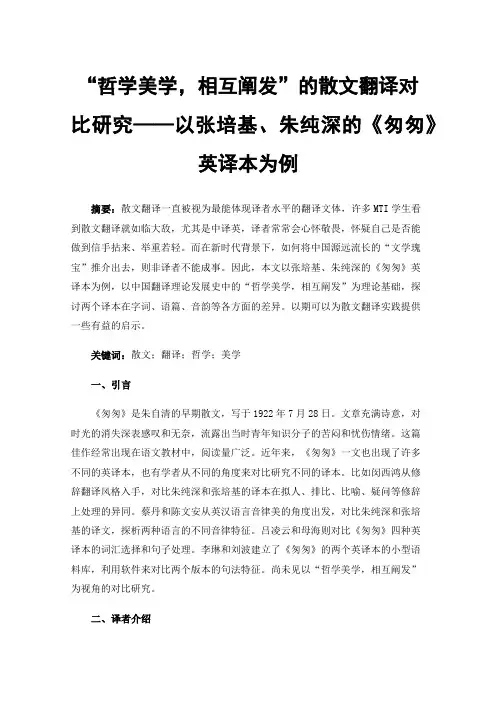
“哲学美学,相互阐发”的散文翻译对比研究——以张培基、朱纯深的《匆匆》英译本为例摘要:散文翻译一直被视为最能体现译者水平的翻译文体,许多MTI学生看到散文翻译就如临大敌,尤其是中译英,译者常常会心怀敬畏,怀疑自己是否能做到信手拈来、举重若轻。
而在新时代背景下,如何将中国源远流长的“文学瑰宝”推介出去,则非译者不能成事。
因此,本文以张培基、朱纯深的《匆匆》英译本为例,以中国翻译理论发展史中的“哲学美学,相互阐发”为理论基础,探讨两个译本在字词、语篇、音韵等各方面的差异。
以期可以为散文翻译实践提供一些有益的启示。
关键词:散文;翻译;哲学;美学一、引言《匆匆》是朱自清的早期散文,写于1922年7月28日。
文章充满诗意,对时光的消失深表感叹和无奈,流露出当时青年知识分子的苦闷和忧伤情绪。
这篇佳作经常出现在语文教材中,阅读量广泛。
近年来,《匆匆》一文也出现了许多不同的英译本,也有学者从不同的角度来对比研究不同的译本。
比如闵西鸿从修辞翻译风格入手,对比朱纯深和张培基的译本在拟人、排比、比喻、疑问等修辞上处理的异同。
蔡丹和陈文安从英汉语言音律美的角度出发,对比朱纯深和张培基的译文,探析两种语言的不同音律特征。
吕凌云和母海则对比《匆匆》四种英译本的词汇选择和句子处理。
李琳和刘波建立了《匆匆》的两个英译本的小型语料库,利用软件来对比两个版本的句法特征。
尚未见以“哲学美学,相互阐发”为视角的对比研究。
二、译者介绍张培基(1921年-2021年6月27日),福建福州市人,对外经济贸易大学任教,中国当代著名翻译家。
1945年毕业于上海圣约翰大学英文系,同年任英文《上海自由西报》记者、英文《中国评论周报》特约撰稿者兼英文《中国年鉴》(1944—1945年度)副总编。
张培基曾在远东国际军事法庭担任英文翻译,并亲身经历过东京审判朱纯深,英国诺丁汉大学博士,曾执教于福建师范大学、新加坡国立大学,曾为香港城市大学中文、翻译及语言学系教授,现为香港中文大学(深圳)人文社科学院翻译专业教授。

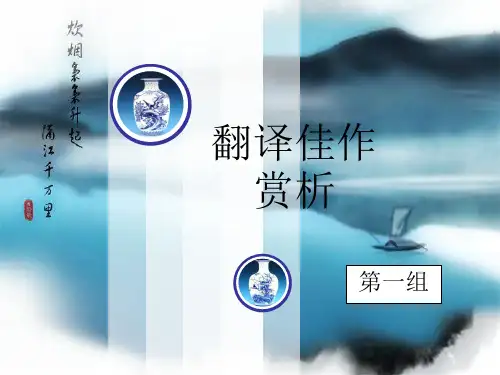

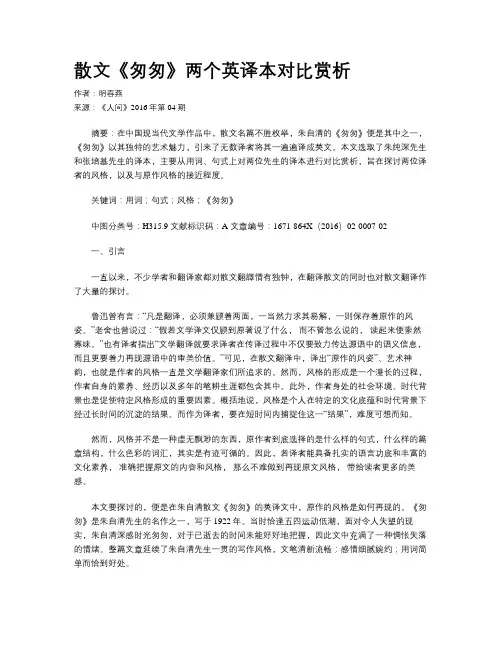
散文《匆匆》两个英译本对比赏析作者:明春燕来源:《人间》2016年第04期摘要:在中国现当代文学作品中,散文名篇不胜枚举,朱自清的《匆匆》便是其中之一,《匆匆》以其独特的艺术魅力,引来了无数译者将其一遍遍译成英文。
本文选取了朱纯深先生和张培基先生的译本,主要从用词、句式上对两位先生的译本进行对比赏析,旨在探讨两位译者的风格,以及与原作风格的接近程度。
关键词:用词;句式;风格;《匆匆》中图分类号:H315.9 文献标识码:A 文章编号:1671-864X(2016)02-0007-02一、引言一直以来,不少学者和翻译家都对散文翻譯情有独钟,在翻译散文的同时也对散文翻译作了大量的探讨。
鲁迅曾有言:“凡是翻译,必须兼顾着两面,一当然力求其易解,一则保存着原作的风姿。
”老舍也曾说过:“假若文学译文仅顾到原著说了什么,而不管怎么说的,读起来便索然寡味。
”也有译者指出“文学翻译就要求译者在传译过程中不仅要致力传达源语中的语义信息,而且更要着力再现源语中的审美价值。
”可见,在散文翻译中,译出“原作的风姿”、艺术神韵,也就是作者的风格一直是文学翻译家们所追求的。
然而,风格的形成是一个漫长的过程,作者自身的素养、经历以及多年的笔耕生涯都包含其中。
此外,作者身处的社会环境、时代背景也是促使特定风格形成的重要因素。
概括地说,风格是个人在特定的文化底蕴和时代背景下经过长时间的沉淀的结果。
而作为译者,要在短时间内捕捉住这一“结果”,难度可想而知。
然而,风格并不是一种虚无飘渺的东西,原作者到底选择的是什么样的句式,什么样的篇章结构,什么色彩的词汇,其实是有迹可循的。
因此,若译者能具备扎实的语言功底和丰富的文化素养,准确把握原文的内容和风格,那么不难做到再现原文风格,带给读者更多的美感。
本文要探讨的,便是在朱自清散文《匆匆》的英译文中,原作的风格是如何再现的。
《匆匆》是朱自清先生的名作之一,写于1922年。
当时恰逢五四运动低潮,面对令人失望的现实,朱自清深感时光匆匆,对于已逝去的时间未能好好地把握,因此文中充满了一种惆怅失落的情绪。
![高中英语[散文佳作108篇(英汉.汉英对照)].乔慧等.word 版](https://uimg.taocdn.com/183d5f41b4daa58da0114a89.webp)
第一部分汉译英1. 丑石(An Ugly Stone)2. 匆匆(Rush)3. 冬夜(Winter Night)4. 互助(Helping Each Other)5. 黄昏(Dusk)6. 盼头(Something to Lookl Forward to)7. 媲美(Beauty)8. 枪口(The Muzzles)9. 鸲鹆(The Story of a Myna)10. 铜镜(The Bronze Mirror)11. 学校(The College)12. 野草(Wild Grass)13. 种梨(Planting a Pear Tree)14. 哀互生(Mourning for Husheng)15. 落花生(The Peanut)16. 盲演员(A Blind Actor)17. “孺子马” (An”Obedient Horse”)18. 小麻雀(A Little Sparrow)19. 雄辩症(A Case of Eloquence)20. 大钱饺子(A Good-luck Dumpling)21. 荷塘月色(Moonlight over the Lotus Pond)22. 黄龙奇观(A View of Huangllong)23. 枯叶蝴蝶(Lappet Butterfies)24. 泡菜坛子(A pickle Pot)25. 田水哗啦(The Irrigation Water Came Gurgling)26. 我若为王(If I Be King)27. 西式幽默(Western Humour)28. 项脊轩志(Xiangjixuan)29. 夜间来客(A Night Visitor——A True Story about a ”Celebrity”Being Interviewed)30. 珍禽血雉(China‘s Native Pheasant)31. 常胜的歌手(A Singer Who Always Wins)32. 健忘的画眉(The Forgetful Song Thrush)33. 可爱的南京(Nanjing the Beloved City)34. 鲁迅先生记(In Memory of Mr.Lu Xun)35. 苗族龙船节(The Miao Drangon-Boat Festival)36. 秋天的怀念(Fond Memories of You)37. 献你一束花(A Bouquet of Flowers for you)38. 鸭巢围的夜(A Night at Mallard-Nest Village)39. 玫瑰色的月亮(The Rosy Moon)40. 内画壶《百子图》(Snuff Bottles with Pictures Inside)41. 维护团结的人(A Man Upholding Unity)42. 我有一个志愿(I Have a Dream)43. 运动员的情操(Sp ortsmen‘s Values)44. 神话世界九寨沟(Jiuzhaigou,China‘s Fairyland)45. 生命的三分之一(One Third of Our Lifetime)46. 我可能是天津人(I Might Have Come from Tianjin)47. 五台名刹画沧桑(The famous Monastery Witnesses Vicissitudes)48. 爱梦想的羞怯女孩(A Shy Dreamer)49. 永久的憧憬和追求(My Lnging and yearning)50. 老人和他的三个儿子(The Old Man and his three sons)51. 乐山龙舟会多姿多彩(dragon-Boat Festival at Leshan)52. 撷自那片芳洲的清供(An Offering from his Sweet homeland)53. 三峡多奇景妙笔夺开工(The Scenic Three Gorges Captured )54. 初中国旅游可到哪些地方(Tips on Traveling to China the First Time)第二部分英译汉1. A Ball to Roll Around(滚球)2. A Boupquet for Miss Benson(送给卞老师的一束花)3. A Boy and His Father Become Partners(父子伙伴情)4. A Gift of Dreams(梦寐以求的礼物)5. A Hard Day in the Kitchen(厨房里的一场闹刷)6. A Nation of Hypochondriacs(一个疑病症患者的国度)7. Are Books an Endangered Species? (书籍是即将灭绝的物种吗?)8. A Sailor‘s Christmas Gift(一个海员的圣诞礼物)9. A Tale of Two Smut Merchants(两上淫秽照片商的故事)10. A Visit with the Folks(探访故亲)11. Canadian Eskimo Lithographs(加拿大爱斯基摩人的石版画)12. Divorce and Kids(离婚与孩子)13. Doug Heir(杜格·埃厄)14. Fame(声誉)15. Felicia‘s Journey(费利西娅的旅行)16. Genius Sacrificed for failure(为育庸才损英才)17. Glories of the Storm(辉煌壮丽的暴风雨)18. Han Suyin‘s China(韩素音笔下的中国)19. Hate(仇恨)20. How Should One Read a Book? (怎样读书?)21. In Praie of the Humble Comma(小小逗号赞)22. Integrity——From A Mother in Mannville(正直)23. In the Pursuit of a Haunting and Timeless Truth(追寻一段永世难忘的史实)24. Killer on Wings is Under Threat(飞翔的杀手正受到威胁)25. Life in a Violin Case(琴匣子中的生趣)26. Love Is Not like Merchandise(爱情不是商品)27. Luck(好运气)28. Mayhew(生活的道路)29. My Averae Uncle(艾默大叔——一个普普通通的人)30. My Father‘s Music(我父亲的音乐)31. My Mother‘s Gift (母亲的礼物)32. New Light Buld Offers Energy Efficiency(新型灯泡提高能效)33. Of Studies(谈读书)34. On Leadership(论领导)35. On Cottages in General(农舍概述)36. Over the Hill(开小差)37. Promise of Bluebirds(蓝知更鸟的希望)38. Stories on a Headboard(床头板上故事多)39. Sunday(星期天)40. The Blanket(一条毛毯)41. The Colour of the Sky(天空的色彩)42. The date Father Didn‘t Keep(父亲失约)43. The Kiss(吻)44. The Letter(家书)45. The Little Boat That Sailed through Time(悠悠岁月小船情)46. The Living Seas(富有生命的海洋)47. The Roots of My Ambition(我的自强之源)48. The song of the River(河之歌)49. They Wanted Him Everywhere——Herbert von Karajan(1908-1989) (哪儿都要他)50. Three Great Puffy Rolls(三个又大双暄的面包圈)51. Trust(信任)52. Why measure Life in Hearbeats? (何必以心跳定生死?)53. Why the bones Break(骨折缘何而起)54. Why Women Live Longer than Men(为什么女人经男人活得长)丑石贾平凹我常常遗憾我家门前的那块丑石呢:它黑黝黝地卧在那里,牛似的模样;谁也不知道是什么时候留在这里的.谁也不去理会它。
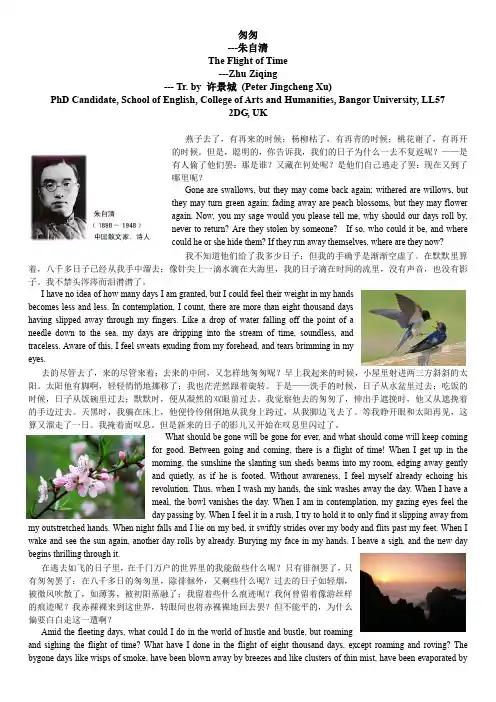
匆匆---朱自清The Flight of Time---Zhu Ziqing--- Tr. by 许景城(Peter Jingcheng Xu)PhD Candidate, School of English, College of Arts and Humanities, Bangor University, LL572DG, UK燕子去了,有再来的时候;杨柳枯了,有再青的时候;桃花谢了,有再开的时候。
但是,聪明的,你告诉我,我们的日子为什么一去不复返呢?——是有人偷了他们罢:那是谁?又藏在何处呢?是他们自己逃走了罢:现在又到了哪里呢?Gone are swallows, but they may come back again; withered are willows, butthey may turn green again; fading away are peach blossoms, but they may floweragain. Now, you my sage would you please tell me, why should our days roll by,never to return? Are they stolen by someone? If so, who could it be, and wherecould he or she hide them? If they run away themselves, where are they now?我不知道他们给了我多少日子;但我的手确乎是渐渐空虚了。
在默默里算着,八千多日子已经从我手中溜去;像针尖上一滴水滴在大海里,我的日子滴在时间的流里,没有声音,也没有影子。
我不禁头涔涔而泪潸潸了。
I have no idea of how many days I am granted, but I could feel their weight in my handsbecomes less and less. In contemplation, I count, there are more than eight thousand dayshaving slipped away through my fingers. Like a drop of water falling off the point of aneedle down to the sea, my days are dripping into the stream of time, soundless, andtraceless. Aware of this, I feel sweats exuding from my forehead, and tears brimming in myeyes.去的尽管去了,来的尽管来着;去来的中间,又怎样地匆匆呢?早上我起来的时候,小屋里射进两三方斜斜的太阳。
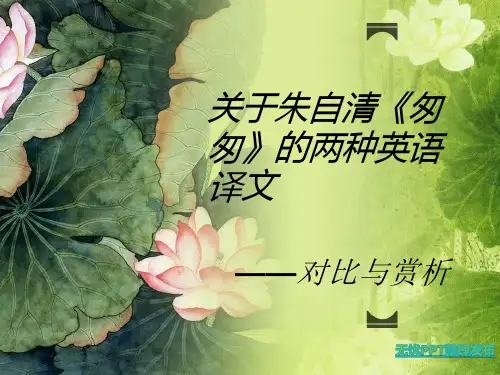
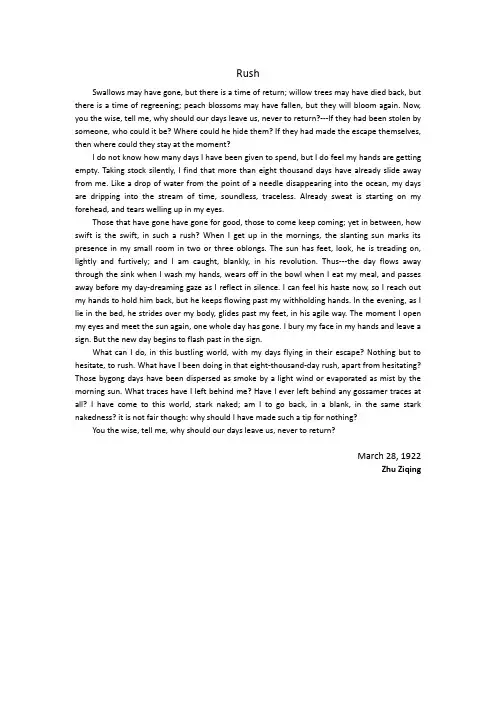
RushSwallows may have gone, but there is a time of return; willow trees may have died back, but there is a time of regreening; peach blossoms may have fallen, but they will bloom again. Now, you the wise, tell me, why should our days leave us, never to return?---If they had been stolen by someone, who could it be? Where could he hide them? If they had made the escape themselves, then where could they stay at the moment?I do not know how many days I have been given to spend, but I do feel my hands are getting empty. Taking stock silently, I find that more than eight thousand days have already slide away from me. Like a drop of water from the point of a needle disappearing into the ocean, my days are dripping into the stream of time, soundless, traceless. Already sweat is starting on my forehead, and tears welling up in my eyes.Those that have gone have gone for good, those to come keep coming; yet in between, how swift is the swift, in such a rush? When I get up in the mornings, the slanting sun marks its presence in my small room in two or three oblongs. The sun has feet, look, he is treading on, lightly and furtively; and I am caught, blankly, in his revolution. Thus---the day flows away through the sink when I wash my hands, wears off in the bowl when I eat my meal, and passes away before my day-dreaming gaze as I reflect in silence. I can feel his haste now, so I reach out my hands to hold him back, but he keeps flowing past my withholding hands. In the evening, as I lie in the bed, he strides over my body, glides past my feet, in his agile way. The moment I open my eyes and meet the sun again, one whole day has gone. I bury my face in my hands and leave a sign. But the new day begins to flash past in the sign.What can I do, in this bustling world, with my days flying in their escape? Nothing but to hesitate, to rush. What have I been doing in that eight-thousand-day rush, apart from hesitating? Those bygong days have been dispersed as smoke by a light wind or evaporated as mist by the morning sun. What traces have I left behind me? Have I ever left behind any gossamer traces at all? I have come to this world, stark naked; am I to go back, in a blank, in the same stark nakedness? it is not fair though: why should I have made such a tip for nothing?You the wise, tell me, why should our days leave us, never to return?March 28, 1922Zhu Ziqing。
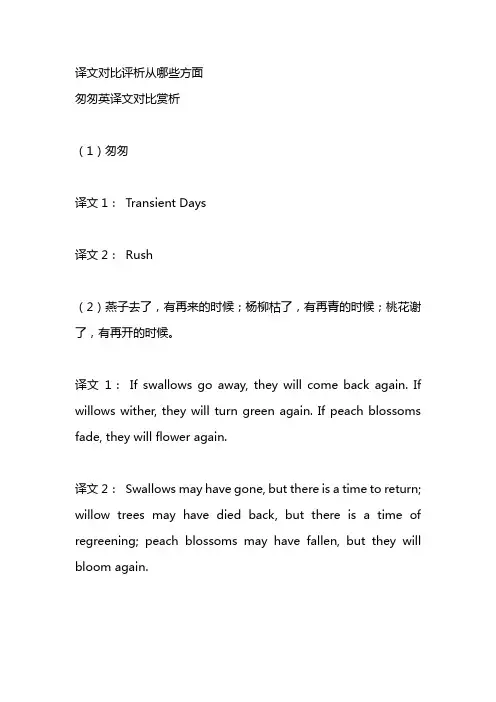
译文对比评析从哪些方面匆匆英译文对比赏析(1)匆匆译文1:Transient Days译文2:Rush(2)燕子去了,有再来的时候;杨柳枯了,有再青的时候;桃花谢了,有再开的时候。
译文1:If swallows go away, they will come back again. If willows wither, they will turn green again. If peach blossoms fade, they will flower again.译文2:Swallows may have gone, but there is a time to return; willow trees may have died back, but there is a time of regreening; peach blossoms may have fallen, but they will bloom again.(3)但是,聪明的,你告诉我,我们的日子为什么一去不复返呢?——是有人偷了他们罢:那是谁?又藏在何处呢?是他们自己逃走了罢:现在又到了哪里呢?译文1:But, tell me, you the wise, why should our days go by never to return? Perhaps they have been stolen by someone. But who could it be and where could he hide them? Perhaps they have just run away by themselves. But where could they be at the present moment?译文2:Now, you the wise, tell me, why should our days leave us, never to return? ----If they had been stolen by someone, who could it be? Where could he hide them? If they had made the escape themselves, then where could they stay at the moment?(4)我不知道他们给了我多少日子;但我的手确乎是渐渐空虚了。
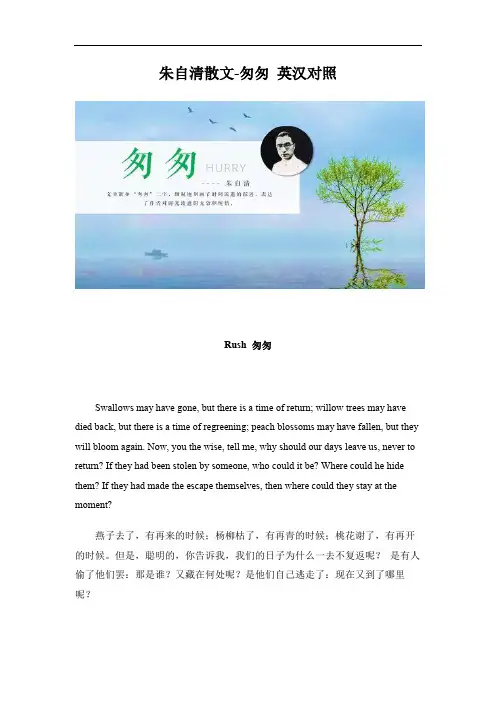
朱自清散文-匆匆英汉对照Rush 匆匆Swallows may have gone, but there is a time of return; willow trees may have died back, but there is a time of regreening; peach blossoms may have fallen, but they will bloom again. Now, you the wise, tell me, why should our days leave us, never to return? If they had been stolen by someone, who could it be? Where could he hide them? If they had made the escape themselves, then where could they stay at the moment?燕子去了,有再来的时候;杨柳枯了,有再青的时候;桃花谢了,有再开的时候。
但是,聪明的,你告诉我,我们的日子为什么一去不复返呢?是有人偷了他们罢:那是谁?又藏在何处呢?是他们自己逃走了:现在又到了哪里呢?I don''t know how many days I have been given to spend, but I do feel my hands are getting empty. Taking stock silently, I find that more than eight thousand days have already slid away from me. Like a drop of water from the point of a needle disappearing into the ocean, my days are dripping into the stream of time, soundless, traceless. Already sweat is starting on my forehead, and tears welling up in my eyes.我不知道他们给了我多少日子;但我的手确乎是渐渐空虚了。
专八翻译_108散文篇章_精选第一部分汉译英1. 丑石(An Ugly Stone)2. 匆匆(Rush)3. 冬夜(Winter Night)4. 互助(Helping Each Other)5. 黄昏(Dusk)6. 盼头(Something to Lookl Forward to)7. 媲美(Beauty)8. 枪口(The Muzzles)9. 鸲鹆(The Story of a Myna) 10. 铜镜(The Bronze Mirror) 11. 学校(The College)12. 野草(Wild Grass)13. 种梨(Planting a Pear Tree) 14. 哀互生(Mourning for Husheng) 15.落花生(The Peanut)16. 盲演员(A Blind Actor)17. “孺子马” (An”Obedient Horse”)18. 小麻雀(A Little Sparrow) 19. 雄辩症(A Case of Eloquence) 20. 大钱饺子(A Good-luck Dumpling) 21. 荷塘月色(Moonlight over the Lotus Pond)22. 黄龙奇观(A View of Huangllong)23. 枯叶蝴蝶(Lappet Butterfies)24. 泡菜坛子(A pickle Pot)25. 田水哗啦(The Irrigation Water Came Gurgling) 26. 我若为王(If IBe King)27. 西式幽默(Western Humour)28. 项脊轩志(Xiangjixuan)29. 夜间来客(A Night Visitor——A True Story abouta ”Celebrity”Being Interviewed)30. 珍禽血雉(China‘s Native Pheasant)31. 常胜的歌手(A Singer Who Always Wins) 32. 健忘的画眉(The Forgetful Song Thrush) 33. 可爱的南京(Nanjing the Beloved City) 34. 鲁迅先生记(In Memory of Mr.Lu Xun)35. 苗族龙船节(The Miao Drangon-Boat Festival) 36. 秋天的怀念(Fond Memories of You)37. 献你一束花(A Bouquet of Flowers for you) 38. 鸭巢围的夜(A Night at Mallard-Nest Village) 39. 玫瑰色的月亮(The Rosy Moon)40. 内画壶《百子图》(Snuff Bottles with Pictures Inside) 41. 维护团结的人(A Man Upholding Unity)42. 我有一个志愿(I Have a Dream)43. 运动员的情操(Sportsmen‘s Values)44. 神话世界九寨沟(Jiuzhaigou,China‘s Fairyland)45. 生命的三分之一(One Third of Our Lifetime)46. 我可能是天津人(I Might Have Come from Tianjin) 47. 五台名刹画沧桑(The famous Monastery Witnesses Vicissitudes) 48. 爱梦想的羞怯女孩(A Shy Dreamer)49. 永久的憧憬和追求(My Lnging and yearning)50. 老人和他的三个儿子(The Old Man and his three sons) 51. 乐山龙舟会多姿多彩(dragon-Boat Festival at Leshan) 52. 撷自那片芳洲的清供(AnOffering from his Sweet homeland) 53. 三峡多奇景妙笔夺开工(The Scenic Three Gorges Captured ) 54. 初中国旅游可到哪些地斱(Tips on Traveling to China the First Time)第二部分英译汉1. A Ball to Roll Around(滚球)2. A Boupquet for Miss Benson(送给卞老师的一束花)3. A Boy and His Father Become Partners(父子伙伴情)4. A Gift of Dreams(梦寐以求的礼物)5. A Hard Day in the Kitchen(厨房里的一场闹刷)6. A Nation of Hypochondriacs(一个疑病症患者的国度)7. Are Books an Endangered Species? (书籍是即将灭绝的物种吗?)8. A Sailor‘s Christmas Gift(一个海员的圣诞礼物)9. A Tale of Two Smut Merchants(两上淫秽照片商的故事)10. A Visit with the Folks(探访故亲)11. Canadian Eskimo Lithographs(加拿大爱斯基摩人的石版画) 12. Divorce and Kids(离婚不孩子)13. Doug Heir(杜格?埃厄)14. Fame(声誉)s Journey(费利西娅的旅行) 15. Felicia‘16. Genius Sacrificed for failure(为育庸才损英才) 17. Glories of the Storm(辉煌壮丽的暴风雨) 18. Han Suyin‘s China(韩素音笔下的中国) 19. Hate(仇恨)20. How Should One Read a Book? (怎样读书?) 21. In Praie of the Humble Comma(小小逗号赞) 22. Integrity——From A Mother in Mannville(正直) 23. In the Pursuit of a Haunting and Timeless Truth(追寻一段永世难忘的叱实)24. Killer on Wings is Under Threat(飞翔的杀手正受到威胁) 25. Lifein a Violin Case(琴匣子中的生趣)26. Love Is Not like Merchandise(爱情不是商品) 27. Luck(好运气)28. Mayhew(生活的道路)29. My Averae Uncle(艾默大叔——一个普普通通的人) 30. My Father‘s Music(我父亲的音乐)31. My Mother‘s Gift (母亲的礼物)32. New Light Buld Offers Energy Efficiency(新型灯泡提高能效) 33. Of Studies(谈读书)34. On Leadership(论领导)35. On Cottages in General(农舍概述)36. Over the Hill(开小差)37. Promise of Bluebirds(蓝知更鸟的希望)38. Stories on a Headboard(床头板上故事多)39. Sunday(星期天)40. The Blanket(一条毛毯)41. The Colour of the Sky(天空的色彩)42. The date Father Didn‘t Keep(父亲失约)43. The Kiss(吻)) 44. The Letter(家书45. The Little Boat That Sailed through Time(悠悠岁月小船情) 46. The Living Seas(富有生命的海洋)47. The Roots of My Ambition(我的自强之源)48. The song of the River(河之歌)49. They Wanted Him Everywhere——Herbert von Karajan(1908-1989) (哪儿都要他)50. Three Great Puffy Rolls(三个又大双暄的面包圈) 51. Trust(信任)52. Why measure Life in Hearbeats? (何必以心跳定生死?)53. Why the bones Break(骨折缘何而起)54. Why Women Live Longer than Men(为什么女人经男人活得长)丑石 An Ugly Stone贾平凹 Jia Pingwa我常常遗憾我家门前的那块丑石呢:它I used to feel sorry for that ugly 黑黝黝地卧在那里,牛似的模样;谁也不知black piece of stone lying like an 道是什么时候留在这里的.谁也不去理会它。
汉译英名篇:朱自清《荷塘月色》杨宪益版这几天心里颇不宁静。
今晚在院子里坐着乘凉,忽然想起日日走过的荷塘,在这满月的光里,总该另有一番样子吧。
月亮渐渐地升高了,墙外马路上孩子们的欢笑,已经听不见了:妻在屋里拍着闰儿,迷迷糊糊地哼着眠歌。
我悄悄地披了大衫,带上门出去。
The last few days have found me very restless・ This evening as I sat in the yard to enjoy the cool it stmek me how different the lotus pool I pass every day must look under a full moon・ The moon was sailing higher and higher up the heavens, the sound of childish laughter had died away from the lane beyond our wall, and my wife was in the house patting Juner and humming a lullaby to him. I quietly slipped on a long gown・ and walked out leaving the door on the latch・沿着荷塘,是一条曲折的小煤屑路。
这是一条幽僻的路:白天也少人泄,夜晚更加寂寞。
荷塘四而,长着许多树,蓊蓊郁郁的。
路的一旁,是些杨柳,和一些不知逍爼字的树。
没有月光的晚上,这路上阴森森的,有些怕人。
今晚却很好,虽然月光也还是淡淡的。
A cinder - path winds along by the side of the pool. It is off the beaten track and few pass this way even by day, so at night it is still more quiet. Trees grow thick and bosky all around the pool, with willows and other trees I cannot name by the path. On nights when there is no moon the track is almost terrifyingly dark, but tonight it was quite clear, though the moonlight was pale.路上只我一个人,背着手踱着。
中国优秀散文英译【考研英语翻译精华】第一部分汉译英1. 丑石(An Ugly Stone)2. 匆匆(Rush)3. 冬夜(Winter Night)4. 互助(Helping Each Other)5. 黄昏(Dusk)6. 盼头(Something to Lookl Forward to)7. 媲美(Beauty)8. 枪口(The Muzzles)9. 鸲鹆(The Story of a Myna)10. 铜镜(The Bronze Mirror)11. 学校(The College)12. 野草(Wild Grass)13. 种梨(Planting a Pear Tree)14. 哀互生(Mourning for Husheng)15. 落花生(The Peanut)16. 盲演员(A Blind Actor)17. “孺子马” (An”Obedient Horse”)18. 小麻雀(A Little Sparrow)19. 雄辩症(A Case of Eloquence)20. 大钱饺子(A Good-luck Dumpling)21. 荷塘月色(Moonlight over the Lotus Pond)22. 黄龙奇观(A View of Huangllong)23. 枯叶蝴蝶(Lappet Butterfies)24. 泡菜坛子(A pickle Pot)25. 田水哗啦(The Irrigation Water Came Gurgling)26. 我若为王(If I Be King)27. 西式幽默(Western Humour)28. 项脊轩志(Xiangjixuan)29. 夜间来客(A Night Visitor——A Tr ue Story about a ”Celebrity”Being Interviewed)30. 珍禽血雉(China‘s Native Pheasant)31. 常胜的歌手(A Singer Who Always Wins)32. 健忘的画眉(The Forgetful Song Thrush)33. 可爱的南京(Nanjing the Beloved City)34. 鲁迅先生记(In Memory of Mr.Lu Xun)35. 苗族龙船节(The Miao Drangon-Boat Festival)36. 秋天的怀念(Fond Memories of You)37. 献你一束花(A Bouquet of Flowers for you)38. 鸭巢围的夜(A Night at Mallard-Nest Village)39. 玫瑰色的月亮(The Rosy Moon)40. 内画壶《百子图》(Snuff Bottles with Pictures Inside)41. 维护团结的人(A Man Upholding Unity)42. 我有一个志愿(I Have a Dream)43. 运动员的情操(Sportsmen‘s Values)44. 神话世界九寨沟(Jiuzhaigou,China‘s Fairyland)45. 生命的三分之一(One Third of Our Lifetime)46. 我可能是天津人(I Might Have Come from Tianjin)47. 五台名刹画沧桑(The famous Monastery Witnesses Vicissitudes)48. 爱梦想的羞怯女孩(A Shy Dreamer)49. 永久的憧憬和追求(My Lnging and yearning)50. 老人和他的三个儿子(The Old Man and his three sons)51. 乐山龙舟会多姿多彩(dragon-Boat Festival at Leshan)52. 撷自那片芳洲的清供(An Offering from his Sweet homeland)53. 三峡多奇景妙笔夺开工(The Scenic Three Gorges Captured )54. 初中国旅游可到哪些地方(Tips on Traveling to China the First Time)丑石贾平凹我常常遗憾我家门前的那块丑石呢:它黑黝黝地卧在那里,牛似的模样;谁也不知道是什么时候留在这里的.谁也不去理会它。
2482018年12期总第400期ENGLISH ON CAMPUS对比赏析朱自清《匆匆》的两种英译文文/喻丽颖【摘要】本文将对翻译中的多样性,直译,意译和语境方面,就朱自清散文《匆匆》的张培基和朱纯深英译文版本进行语言特色对比赏析。
【关键词】匆匆;多样性;直译;意译;语境;彼得·纽马克【Abstract】This thesis will give a comparative appreciation of linguistic feature of Transient Day (Zhu Cunshen’s and Zhang Peiji’s translations) in the aspect of diversity of translation, literal translation, liberal translation, and context.【Key words】Transient Day; diversity; literal translation; liberal translation; context【作者简介】喻丽颖(1997- ),女,汉族,湖北武汉人,湖北文理学院,学生,在读本科生,专业方向:英语翻译。
一、引言翻译本身没有对与错,重点在于如何在翻译的译文中达到原文作者想要表达的情感与意义。
这也就有了我们所说的翻译的多样性。
对于词的选择最为重要,并且在翻译前要深入理解朱自清先生的情感表达,通过对语境的分析从而选择翻译的方法。
二、对比赏析《匆匆》1.关于翻译中的多样性。
在翻译中注意译文的多样性也是十分重要的。
用丰富多彩而又贴切得当的语言形式,把反复出现而又意思不变的句子,词组,成语,词语译得生动活泼,这就是所谓的翻译中的多样性。
例1:“匆匆”之译朱译:rush,haste,张译:transient days; transition; fleeting presence; live a transient life; fleeting days,文中一共出现5次“匆匆”。
第一部分汉译英1. 丑石(An Ugly Stone)2. 匆匆(Rush)3. 冬夜(Winter Night)4. 互助(Helping Each Other)5. 黄昏(Dusk)6. 盼头(Something to Lookl Forward to)7. 媲美(Beauty)8. 枪口(The Muzzles)9. 鸲鹆(The Story of a Myna)10. 铜镜(The Bronze Mirror)11. 学校(The College)12. 野草(Wild Grass)13. 种梨(Planting a Pear Tree)14. 哀互生(Mourning for Husheng)15. 落花生(The Peanut)16. 盲演员(A Blind Actor)17. “孺子马” (An”Obedient Horse”)18. 小麻雀(A Little Sparrow)19. 雄辩症(A Case of Eloquence)20. 大钱饺子(A Good-luck Dumpling)21. 荷塘月色(Moonlight over the Lotus Pond)22. 黄龙奇观(A View of Huangllong)23. 枯叶蝴蝶(Lappet Butterfies)24. 泡菜坛子(A pickle Pot)25. 田水哗啦(The Irrigation Water Came Gurgling)26. 我若为王(If I Be King)27. 西式幽默(Western Humour)28. 项脊轩志(Xiangjixuan)29. 夜间来客(A Night Visitor——A True Story about a ”Celebrity”Being Interviewed)30. 珍禽血雉(China‘s Native Pheasant)31. 常胜的歌手(A Singer Who Always Wins)32. 健忘的画眉(The Forgetful Song Thrush)33. 可爱的南京(Nanjing the Beloved City)34. 鲁迅先生记(In Memory of Mr.Lu Xun)35. 苗族龙船节(The Miao Drangon-Boat Festival)36. 秋天的怀念(Fond Memories of You)37. 献你一束花(A Bouquet of Flowers for you)38. 鸭巢围的夜(A Night at Mallard-Nest Village)39. 玫瑰色的月亮(The Rosy Moon)40. 内画壶《百子图》(Snuff Bottles with Pictures Inside)41. 维护团结的人(A Man Upholding Unity)42. 我有一个志愿(I Have a Dream)43. 运动员的情操(Spo rtsmen‘s Values)44. 神话世界九寨沟(Jiuzhaigou,China‘s Fairyland)45. 生命的三分之一(One Third of Our Lifetime)46. 我可能是天津人(I Might Have Come from Tianjin)47. 五台名刹画沧桑(The famous Monastery Witnesses Vicissitudes)48. 爱梦想的羞怯女孩(A Shy Dreamer)49. 永久的憧憬和追求(My Lnging and yearning)50. 老人和他的三个儿子(The Old Man and his three sons)51. 乐山龙舟会多姿多彩(dragon-Boat Festival at Leshan)52. 撷自那片芳洲的清供(An Offering from his Sweet homeland)53. 三峡多奇景妙笔夺开工(The Scenic Three Gorges Captured )54. 初中国旅游可到哪些地方(Tips on Traveling to China the First Time)第二部分英译汉1. A Ball to Roll Around(滚球)2. A Boupquet for Miss Benson(送给卞老师的一束花)3. A Boy and His Father Become Partners(父子伙伴情)4. A Gift of Dreams(梦寐以求的礼物)5. A Hard Day in the Kitchen(厨房里的一场闹刷)6. A Nation of Hypochondriacs(一个疑病症患者的国度)7. Are Books an Endangered Species? (书籍是即将灭绝的物种吗?)8. A Sailor‘s Christmas Gift(一个海员的圣诞礼物)9. A Tale of Two Smut Merchants(两上淫秽照片商的故事)10. A Visit with the Folks(探访故亲)11. Canadian Eskimo Lithographs(加拿大爱斯基摩人的石版画)12. Divorce and Kids(离婚与孩子)13. Doug Heir(杜格·埃厄)14. Fame(声誉)15. Felicia‘s Journey(费利西娅的旅行)16. Genius Sacrificed for failure(为育庸才损英才)17. Glories of the Storm(辉煌壮丽的暴风雨)18. Han Suyin‘s China(韩素音笔下的中国)19. Hate(仇恨)20. How Should One Read a Book? (怎样读书?)21. In Praie of the Humble Comma(小小逗号赞)22. Integrity——From A Mother in Mannville(正直)23. In the Pursuit of a Haunting and Timeless Truth(追寻一段永世难忘的史实)24. Killer on Wings is Under Threat(飞翔的杀手正受到威胁)25. Life in a Violin Case(琴匣子中的生趣)26. Love Is Not like Merchandise(爱情不是商品)27. Luck(好运气)28. Mayhew(生活的道路)29. My Averae Uncle(艾默大叔——一个普普通通的人)30. My Father‘s Music(我父亲的音乐)31. My Mother‘s Gift (母亲的礼物)32. New Light Buld Offers Energy Efficiency(新型灯泡提高能效)33. Of Studies(谈读书)34. On Leadership(论领导)35. On Cottages in General(农舍概述)36. Over the Hill(开小差)37. Promise of Bluebirds(蓝知更鸟的希望)38. Stories on a Headboard(床头板上故事多)39. Sunday(星期天)40. The Blanket(一条毛毯)41. The Colour of the Sky(天空的色彩)42. The date Father Didn‘t Keep(父亲失约)43. The Kiss(吻)44. The Letter(家书)45. The Little Boat That Sailed through Time(悠悠岁月小船情)46. The Living Seas(富有生命的海洋)47. The Roots of My Ambition(我的自强之源)48. The song of the River(河之歌)49. They Wanted Him Everywhere——Herbert von Karajan(1908-1989) (哪儿都要他)50. Three Great Puffy Rolls(三个又大双暄的面包圈)51. Trust(信任)52. Why measure Life in Hearbeats? (何必以心跳定生死?)53. Why the bones Break(骨折缘何而起)54. Why Women Live Longer than Men(为什么女人经男人活得长)丑石贾平凹我常常遗憾我家门前的那块丑石呢:它黑黝黝地卧在那里,牛似的模样;谁也不知道是什么时候留在这里的.谁也不去理会它。
英汉互译散文:匆匆Rush
匆匆
Rush
朱自清
Zhu Ziqing
燕子去了,有再来的时候;杨柳枯了,有再青的时候;桃花谢了,有再开的时候。
但是,聪明的,你告诉我,我们的日子为什么一去不
复返呢?——是有人偷了他们罢:那是谁?又藏在何处呢?是他们自
己逃走了罢;现在又到了哪里呢?
Swallows may have gone, but there is a time of return; willow trees may have died back, but there is a time of regreening; peach blossoms may have fallen, but they will bloom again. Now, you the wise, tell me, why should our days leave us, never to return? 一If they had been stolen by someone, who could it be? Where could he hide them? If they had made the escape themselves, then where could they stay at the moment?[qh]
我不知道他们给了我多少日子;但我的手确乎是逐步空虚了。
在
默默里算着,八千多日子已经从我手中溜去;像针尖上一滴水滴在大
海里,我的日子滴在时间的流里,没有声音,也没有影子。
我不禁头
涔涔而泪潸潸了。
I do not know how many days I have been given to spend,
but I do feel my hands are getting empty. Taking stock silently, I find that more than eight thousand days have already slid away from me. Like a drop of water from the
point of a needle disappearing into the ocean, my days are
dripping into the stream of time, soundless, traceless. Already sweat is starting on my forehead, and tears welling
up in my eyes.
去的即使去了,来的即使来着,去来的中间,又怎样地匆匆呢?
早上我起来的时候,小屋里射进两三方斜斜的太阳。
太阳他有脚啊,
轻轻悄悄地挪移了;我也茫茫然跟着旋转。
于是——洗手的时候,日
子从水盆里过去;吃饭的时候,日子从饭碗里过去;默默时,便从凝
然的双眼前过去。
我觉察他去的匆匆了,伸出手遮挽时,他又从遮挽
着的手边过去,天黑时,我躺在床上,他便伶伶俐俐地从我身上跨过,从我脚边飞去了。
等我睁开眼和太阳再见,这算又溜走了一日。
我掩
着面叹息。
但是新来的日子的影儿又开始在叹息里闪过了。
Those that have gone have gone for good, those to come between, how swift is the shift, in such a rush? When I get
up in the morning, the slanting sun marks its presence in my small room in two or three oNongs. The sun has feet, look, he is treading on, lightly and furtively; and I am caught, blankly, in his revolution. Thus—the day flows away through the sink when I wash my hands, wears off in the bowl when I
eat my meal. and passes away before my day-dreaming gaze as I reflect in silence. I can feel his haste now, so I reach out my hands to hold him back, but he keeps flowing past my withholding hands. In the evening, as I lie in bed, he
strides over my body, glides past my feet, in his agile way. The moment I open my eyes and meet the sun again, one whole day has gone. I bury my face in my hands and heave a sigh.
But the new day begins to flash past in the sigh.
在逃去如飞的日子里,在千门万户的世界里的我能做些什么呢?
只有徘徊罢了,只有匆匆罢了;在八千多日的匆匆里,除徘徊外,又
剩些什么呢?过去的日子如轻烟被微风吹散了,如薄雾,被初阳蒸融
了;我留着些什么痕迹呢?我何曾留着像游丝样的痕迹呢?我赤裸裸来到这世界,转眼间也将赤裸裸的回去罢?但不能平的,为什么偏要白白走这个遭啊?
What can I do, in this bustling world, with my days
flying in their escape? Nothing but to hesitate, to rush. What have I been doing in that eight-thousand-day rush, apart from hesitating? Those bygone days have been dispersed as smoke by a light wind, or evaporated as mist by the morning sun. What traces have I leftbehind me? Have I ever left behind any gossamer traces at all? I have come to this world, stark naked; am I to go back, in a blink, in the same stark nakedness? It is not fair though: why should I have made such a trip for nothing!
你聪明的,告诉我,我们的日子为什么一去不复返呢?
You the wise, tell me, why should our days leave us, never to return?
1922.3.28
March 28, 1922。